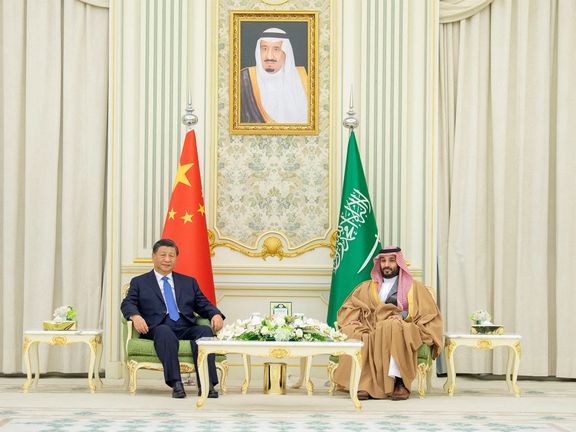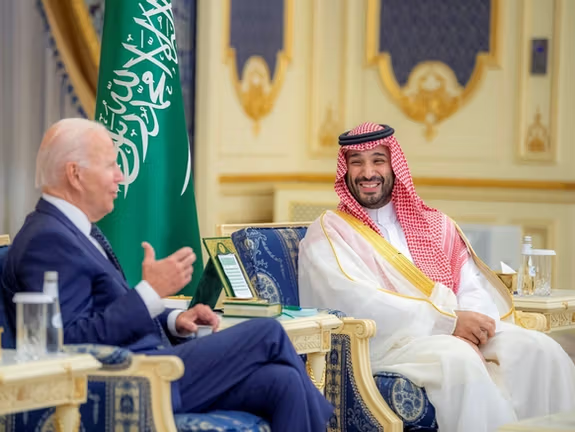Saudi Plays The Chinese Card In Race For Nuclear Parity With Iran

As Saudi Arabia continues to pursue an ambitious nuclear program, it has turned to China to pressure Washington as US talks stall.

As Saudi Arabia continues to pursue an ambitious nuclear program, it has turned to China to pressure Washington as US talks stall.
The Kingdom’s bid to reach parity with Iran, in spite of revived diplomatic relations this year, is driving the Persian Gulf’s oil powerhouse to reach out to China, according to the Wall Street Journal.
Saudi Arabia has asked the US to help it develop a civilian nuclear program as part of a potential deal that would include diplomatic normalization with Israel, which Riyadh doesn’t recognize. Saudi Arabia is also asking the US to provide security guarantees for the kingdom as part of such a deal.
It is causing dilemmas for the United States, which is walking a tightrope in the region, with continuing tensions with Iran and an ever-hungrier Saudi Arabia seeking uranium enrichment on its home soil.
Bypassing the US in favor of China, which earlier this year was a major part of the negotiations to reinstate diplomatic relations between Iran and Saudi, is a firm statement that with or without President Joe Biden’s agreement, Riyadh will do all it can to forge its way into the nuclear domain.

According to Israel’s Haaretz, leading American and Israeli experts are warning the Biden administration not to accept Saudi demands for uranium enrichment as part of a future US-Saudi-Israeli normalization agreement, for fear it will build its own nuclear weapons.
The fears emerged after Israel’s Strategic Affairs Minister Ron Dermer did not rule out Saudi uranium enrichment during an interview with PBS. He argued the Saudis could go to China or France to set up a native nuclear enrichment program, suggesting it would be better to have the US, Israel’s most important ally, involved.
A Saudi-Israel deal, alongside the shadow war with Iran, is atop Israeli Prime Minister Benjamin Netanyahu’s agenda, and many in Israel fear he will reach it at any cost as he approaches the end of his decades-long political career.
Opposition leader Yair Lapid said this week: “It is clear to everyone that if they [Saudi] start enriching uranium in the Middle East, everyone will want to."
Until now, the US has said American nuclear aid is contingent on the Saudis agreeing to not enrich their own uranium or mine their own uranium deposits in the kingdom—non-proliferation conditions not sought by China, which has been seeking to strengthen its influence in the Middle East.
China National Nuclear Corp., a state-owned company known as CNNC, has bid to build a nuclear plant in Saudi Arabia’s Eastern Province, near the border with Qatar and the United Arab Emirates, according to the WSJ, which claims the dealings with China are a pressure tactic on Washington as the two nations drifted further apart since the Biden administration came to power.
Biden promised to make Saudi a ‘pariah state’ after the brutal assassination of US-Saudi journalist Jamal Khashoggi, which has caused years of tension between Biden and Saudi’s de facto ruler, Crown Prince Mohammed Bin Salman.
Crown Prince Mohammed Bin Salman has made obtaining nuclear power a priority. After a decade of discussions, the Saudis are now impatiently pushing to award a contract for the Eastern Province plant, known as Duwaiheen—a two-reactor, 2.8-gigawatt facility—by the end of 2023 and eventually construct 16 reactors at a cost of some $80 billion to $100 billion.
Driven by the desire for parity with Iran in addition to looking towards a time when the kingdom’s main export, oil, is no longer a viable revenue source and nuclear power would offer a viable alternative, time is now ticking. MBS has made no secret of his willingness to develop nuclear weapons if Iran does.
China has already helped Riyadh build its own ballistic missiles and helped the Saudis with a facility for extracting uranium yellowcake from uranium ore, an initial step toward enriching uranium.
There is no doubt that Saudi Crown Prince has his eye on being the region’s political powerhouse, a fact which has more recently created tensions with the UAE’s President and MBS’s initial mentor on his rise to power, Mohammed Bin Zayed.
Close allies of the US such as the UAE and South Korea have accepted stronger restrictions on their nuclear programs and will see US support for enrichment on Saudi soil as a justification to demand the same.
Where the Israeli factor plays into the next stages of the race to nuclear is yet to be seen, the Prime Minister’s office claiming hours after Dermer’s comments that it will not allow any of its neighbors to develop nuclear weapons, but there seems no doubt that Saudi Arabia will get its way, whatever the cost.